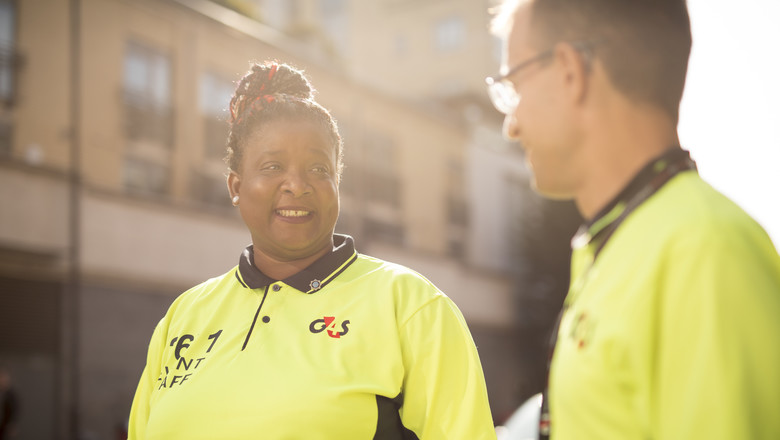G4S event security experts explain what threats and challenges event organisers will have to consider as Covid-19 restrictions lift in the UK.
Safe return of events: Covid-19 is not the only threat

Major event organisers that are looking to ‘return to live’ have a difficult decision to make right now. Will they postpone for another year, or return this season under government guidance, and in an untested environment?
Those choosing the latter will be under scrutiny, and events will only be made possible again by adopting and enforcing the important Covid safety measures we’ve all become accustomed to in recent months - although we are yet to know exactly what these will look like.
Joanne Burke, Operations Manager for G4S Events in Scotland, discusses how major event organisers can safely minimise contact safely.
David Bellas, Area Manager in the North for G4S Events UK, explains the importance of security measures to support social distancing at events
Reduced capacities and elements of social distancing, face covering, contact tracing, and testing will need to be considered and implemented to ensure people’s safety. Here, G4S events specialists explain why other elements of safety and security must not be compromised as a result of focusing too much on Covid-related measures.
The danger of fixating on Covid-19 measures
“Crowd management is an essential part of any event security operation,” explains Chris Burr, Managing Director G4S Events UK.
“Managing large crowds and the risks these attract such as injuries, disturbances, and the ever present threat of terrorist attacks were a key focus area across our industry long before Covid-19 measures were implemented. These risks still exist and need to be considered at future gatherings,” he adds.
As we move on with the right protection against Covid, the basic principles of event security must not be forgotten. All the risks that were prevalent before the pandemic will still be there, and similarly, counter terrorism awareness is at the forefront of our industry with the recently opened consultation, ‘Protect Duty’ - also known as ‘Martyn’s Law’. If successful, this could compel public venues and spaces to undergo thorough counter-terror training and implement more specific security policies.
“Looking ahead we need to prepare and put in place mitigation for people’s future behaviours,” says Paul Manson, G4S Events Regional Head - North.
“After a year of not just reduced social interactions but to actively discourage social and physical engagement, it will be a shock to many when we finally return to busy crowds and environments. Event organisers will have to be even more vigilant when it comes to mitigating human incidents, particularly those related to consumption of alcohol, such as violence, excessive drinking and anti social behaviour - or underlying mental health issues that may have been exasperated by conditions in lockdown,” he explains.
Managing large crowds and the risks these attract such as injuries, disturbances, and the ever present threat of terrorist attacks were a key focus area across our industry long before Covid-19 measures were implemented. These risks still exist and need to be considered at future gatherings
Has Covid-19 affected operational resilience?
After months of Covid-19 restrictions preventing large gatherings from taking place in the UK, the idea of their return in such a short amount of time has certainly amplified concerns of an impending risk to public safety directly through the shortage of infrastructure and available personnel in the safety and security industry.
Already, event organisers are looking to secure sufficient resources for their events as this will be essential to maintaining a safe environment - especially as additional time, money, space and people will be required if Covid safety measures are to be enforced. And with the ongoing national response to the pandemic, national shortages of shared equipment such as marquees, fencing and generators must also be considered.
Organisations like G4S have actively redeployed elements of their workforce throughout the pandemic. Chris Burr explains why this presents a fantastic advantage: “Throughout the pandemic, we’ve been fortunate to be able to redeploy 60% of our workforce across our Covid-related contracts, such as the Nightingale hospitals and regional and local testing sites across the UK. This has not only maintained staffing levels, but also allowed our colleagues to gain invaluable experience in Covid safety which will be transferable once events return.”
In addition to this, passionate events staff across the industry will be looking forward to returning to event work as soon as this is possible. “In fact, a recent survey of our workforce revealed that 83% of our colleagues would like to return to working at events, so this puts G4S Events in a really strong position.” says Paul Manson.
Looking forward
“Internally we’ve implemented our return to live plan and we are already running campaigns to ensure refresher staff training and awareness campaigns as we get ready for the safe return of events. We’ve also picked up risk management training with other organisations, offering support to help event organisers return to normal operations in the safest way possible,” Paul adds.
At long last, there appears to be light at the end of the tunnel for the events industry, and our teams are already busy planning ahead. What’s important is to consider both alternatives in our security measures; Covid-19 will evidently continue to be a major risk, but it won’t be the only one. There are many other risks, which have always been around, that event organisers need to remain cognisant of to ensure safety and to provide that service excellence that customers expect.
At long last, there appears to be light at the end of the tunnel for the events industry, and our teams are already busy planning ahead. What’s important is to consider both alternatives in our security measures; Covid-19 will evidently continue to be a major risk, but it won’t be the only one. There are many other risks, which have always been around, that event organisers need to remain cognisant of to ensure safety and to provide that service excellence that customers expect.
